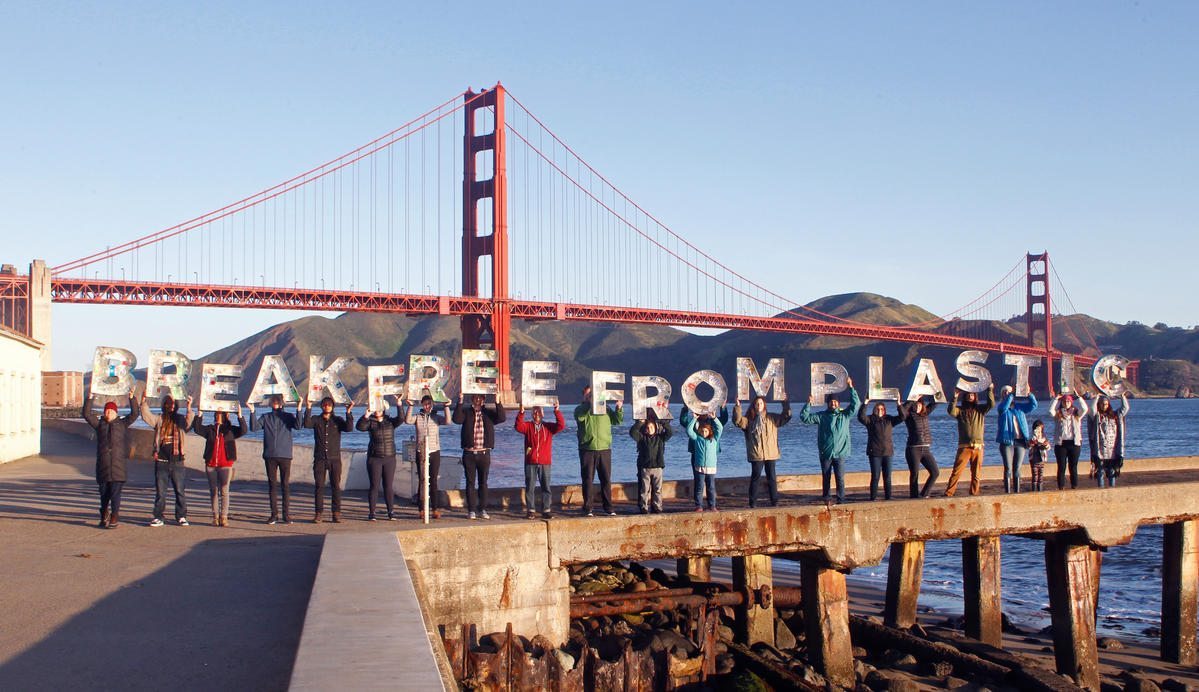Washington, DC – More than one million people ahead of this year’s Earth Day (April 22) are demanding that the world’s largest corporations reduce their production of single-use plastic.
Around the globe, over one million individuals have signed petitions, taken to stores and restaurants, and posted photos of ridiculous packaging on social media to call out corporations like Coca-Cola, Pepsi, Nestlé, Unilever, Procter & Gamble, McDonald’s, and Starbucks for their massive single-use plastic footprints. Greenpeace, as part of the #BreakFreeFromPlastic movement, is urging individuals worldwide to contribute to an additional “Million Acts of Blue”: escalating actions that push local businesses, corporations, restaurants, and retailers to reduce their reliance on single-use plastics.
Ahead of Earth Day, artists have also created massive works of beach art throughout Europe calling attention to the issue of ocean plastic pollution.
“We are reaching a tipping point on single-use plastics, and it is time for any corporation that cares about a healthy planet to go beyond recycling alone. Throwaway plastics continue to pour into our oceans, our waterways, and our communities at an alarming rate,” said Graham Forbes, a Plastics Campaigner at Greenpeace USA.
“This Earth Day, it is time to confront the reality that we cannot simply recycle our way out of this mess. We must address the corporate addiction to single-use plastics and move in a better direction.”
Greenpeace and activists around the world have taken action throughout the month of April to reject the single-use plastics that corporations sell consumers. Activities included:
- In the U.S., Greenpeace activists deployed two signs near the Golden Gate Bridge in San Francisco that read “Break Free From Plastic” and “Stop Corporate Plastic Pollution,” featuring logos of seven companies with massive plastic footprints. Greenpeace USA is also bringing its hot air balloon with a Break Free From Plastic message to world’s largest environmental festival in Texas.
- In Russia, activists installed three billboards outside of a supermarket location for the country’s largest retailer, X5 Retail Group, calling on the company to act on single-use plastic bags.
- In the Philippines, Greenpeace partnered with a local artist collective to stage the ECOlta Fair and Plastic-Free party, which engaged individuals who aim to live free from plastic or reduce their waste.
- In South Africa, Senegal, Cameroon, and Kenya, Greenpeace Africa is working with volunteers to conduct beach and town cleanups and brand audits to identify the companies responsible for plastic pollution.
- In Spain, as part of a movement called #DesnudalaFruta, local groups are visiting retailers to demand solutions and educate consumers on the amount of plastic packaging with their products.
- In Mexico, a group of activists collected and photographed packaging from seven of the world’s largest companies. In Veracruz, plastic artist Francisco Javier Calvillo made a sand sculpture of a giant turtle with a message for corporations.
“The solution is to turn off the plastics tap and decisively end the non-essential, single-use applications of the material. Increasing public revulsion over single-use plastics should be seen by policy makers and regulators as a sign that citizens want better protection from their leaders against the continuing onslaughts of an industry committed to pursuing bigger profit margins at the expense of a planet already drowning in plastic,” said Von Hernandez, the Global Coordinator for Break Free From Plastic.
Earth Day has become an opportunity for many corporations to greenwash around recycling efforts and continue churning out throwaway plastic. This Earth Day, Greenpeace is looking to shift the narrative around single-use plastics from one of individual responsibility toward corporations reducing their production of throwaway plastic packaging.
###
Notes:
A study revealed that 91 percent of the world’s plastics have not been recycled. The equivalent of one truckload of plastic enters our oceans every minute.
Plastic pollution can choke or entangle marine life, including seabirds, turtles, and whales. The United Nations Environment Programme (UNEP) estimates that ocean plastics are responsible for the deaths of hundreds of thousands of sea creatures each year.
The international #BreakFreeFromPl
Greenpeace released a toolkit today to help individuals demand action on plastic pollution, available here: www.greenpeace.org/Milli
Photo and video:
For photos of actions against single-use plastics around the globe, click here.
For photos of EEB’s beach art throughout Europe, click here.
For a wide photo and video collection of ocean plastic pollution, click here.
For the Million Acts of Blue video Greenpeace released today, click here.
Contacts:
Perry Wheeler, Greenpeace USA Senior Communications Specialist, +1 301 675 8766, perry.wheeler@greenpeace
Greenpeace International Press Desk, +31 20 718 2470, pressdesk.int@greenpeace
Written by Perry Wheeler. Blog originally appeared at Greenpeace.




